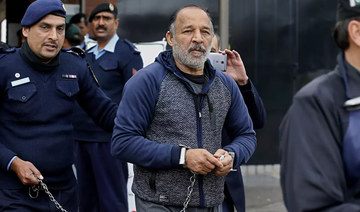NEW DELHI: What’s in a name? Well, in the case of Agra, it could mean rewriting history and rebranding the “city of love.”
If the regional government of the northern Indian state of Uttar Pradesh has its way, the historical city of Agra — home to the famous Taj Mahal — might soon have a new name. The authorities set up a committee on Nov. 18 assigning Agra-based Ambedkar University the task of finding a suitable replacement.
“We have received a letter from the state government to look for historical evidence whether Agra city was known by any other name. We have begun the research and will reply to the letter,” Prof. Sugam Anand, head of history department of Ambedkar University, said.
“The history department will study the past history of Agra and suggest the name.”
Agra came to prominence in India in the medieval ages when the Muslim ruler Sikander Lodi moved the capital from Delhi to Agra in 1504 due to its strategic location. The first Mughal ruler Babar, after defeating the Lodi ruler in 1526, retained Agra as his capital and laid the foundations for Agra fort, the seat of the Mughal power.
In the late 16th century the Mughal king Akbar tried building a new capital near Agra at Fateh pur Sikri but the plan was abandoned due to the lack of water in the region.
In the early 17th century the Mughal ruler Shah Jahan built the Taj Mahal, a white marble monument of love in memory of his wife Mumtaz Mahal, on the bank of the river Yamuna in Agra.
In 1648, Shah Jahan moved the capital to Delhi but Agra retained its attraction due to the Taj Mahal.
Every year more than 1.6 million tourists from around the world visit the historical sites in Agra, generating more than $5 million revenue.
Agra was in the news two years ago also when the Bharatiya Janata Party (BJP) government in Uttar Pradesh removed Taj Mahal from its tourism directory. After an outcry it was restored, but critics felt that this was an attempt to undermine the Islamic places and history of the state by the Hindu right-wing government under the leadership of Yogi Adityanath.
Rather than addressing the real issues of the day like poverty, lack of education or economic slowdown, the government instead is picking up such issues which are creating Hindu-Muslim divide. I find it reprehensible. This destroys the idea of India.
Prof. Aditya Mukherjee Historian, Jawaharlal Nehru University
The BJP legislator from Agra, Jagan Prasad Garg, says that the word “Agra” does not have a meaning; the place was called “Agarvan” 5,000 years ago and therefore “its name should revert to its original form.”
Rajiv Saxena, of the Agra-based tourism guild, says that “this is the regressive step to change the name of a historical place.”
“By changing the name of a place like Agra you are reducing the market and historical value of the place. This name has been continuing for 500 years. Instead of spending money and time on renaming the place why does not the government make a serious effort to refurbish the existing image and multiply the business and tourism opportunities,” Saxena told Arab News.
“Agra is a heritage of India. If the government tries to undo the historical heritage this does not send a right signal. This creates space for the reactionary and sectarian elements to come up in the society,” he added.
Aarti Kumari, a business professional based in Agra, felt that “the government is wasting time on unnecessary issues. We are proud of Agra and it should be like that.”
He said: “I cannot imagine myself calling Agra by a different name. I cannot live with this reality that Agra is not Agra.”
This is not for the first time a change in the name of a city known for its Islamic past has been affected in Uttar Pradesh.
In October 2018 the city of Allahabad, established by the popular Mughal ruler Akbar in 16th century, was renamed Prayagraj. The city is located at the confluence of the river Ganges and Yamuna and is a popular religious destination for Hindus. Allahabad played a great role in India’s freedom struggle. However, the BJP regime decided to give the city a Hindu name.
The government also changed the name of the district of Faizabad and renamed it Ayodhya. Earlier Ayodhya was just a small town in the Faizabad district but Chief Minister Adityanath did not want the Hindu holy city to be associated with an Islamic name.
In 2017, the UP government renamed a major railway station Mughalsarai as Pandit Deen Dayal Upadhyaya, after a Hindu right-wing leader.
“Rather than addressing the real issues of the day like poverty, lack of education or economic slowdown, the government instead is picking up such issues which are creating Hindu-Muslim divide. I find it reprehensible. This destroys the idea of India,” says Prof. Aditya Mukherjee, a prominent historian in Delhi based Jawaharlal Nehru University (JNU).
“The change is only of those places where Muslim names are involved or where Muslim influence is significant. There must be hundreds of such places with Islamic names and past. What is the purpose of changing the name? The ruling regime not only wants to sideline Muslim history but also demonize them and glorify the ancient time which does not have anything to do with history,” Mukherjee said.



























